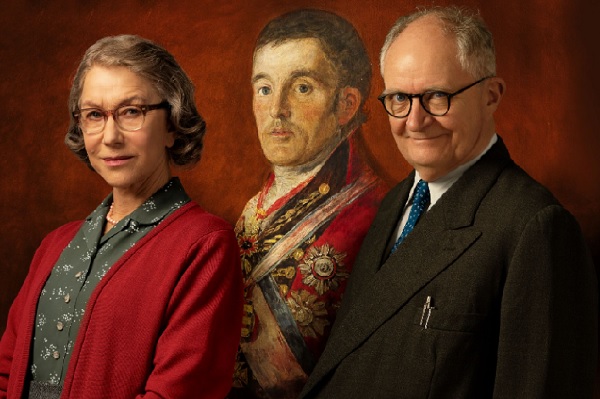
Directed by Roger Michell (Notting Hill; Hyde Park on Hudson; Blackbird) and starring Jim Broadbent (Iris; Longford; The Iron Lady; Gangs of New York), Helen Mirren (The Queen; The Madness of King George; Hitchcock; Gosford Park) and Fionn Whitehead (Dunkirk; The Children Act; The Picture of Dorian Gray).
Drama, 96 mins; 6+
Set in 1961 in the north of England, it tells the story of Kempton Bunton (Jim Broadbent), a 60 year-old taxi driver who lives in Newcastle and who steals Goya's portrait of the Duke of Wellington from the National Gallery in London.
Kempton Bunton and his wife Dorothy Bunton (Helen Mirren) live with their youngest son, Jackie Bunton (Fionn Whitehead) who is in his early 20s. Their elder son has moved to Leeds; Kempton and Dorothy both mourn the loss of their daughter in different ways.
He is very much a socialist, feeling strongly and campaigning about issues such as offering TV licences to old age pensioners (OAPs), while also penning dramas addressing grief (Dorothy frowns on this activity of his as she fails he would be profiting from their daughter's sad death) - he says he prefers Chekov to Shakespeare. Dorothy works as a cleaner for the wife of a local councillor; Jackie is starting to choose a career and is leaning towards building boats; and his brother seems to be "up to no good" away from home.
One of the big issues in the news is the purchase by the National Gallery of Goya's portrait of the Duke of Wellington, for £140,000 (around £3 million in today's money), a sum which Kempton believes the interest alone would pay for the lack of revenue from tv licences for OAPs.
Disgruntled, he travels to London to try to get one of the national newspapers in Fleet Street to take up his story. Despondent, he decides to steal the painting and brings it back to Newcastle where Jackie (who is very sympathetic towards, and supportive of, his father) makes a false back to a wardrobe and they hide it there. He then writes to a newspaper, part ransom notes (he would return the painting on condition that the government invested more in care for the elderly) and part seeing if he could be able to claim the £5,000 reward...
An excellent and uplifting British drama, part nostalgic and melancholy and part retelling the story of a decent man, someone who was quite opinionated and whose personality was certainly colourful, but who knew right from wrong and was not afraid to say so. Some would describe him as a lovable rogue. He stood up to bosses who picked on immigrant workers, arguing that everyone was equal. Excellent costumes and decor inside their home, as well as the cityscapes in London (and Newcastle too).
It resonates with recent films such as I, Daniel Blake and Sorry I Missed You, both by Ken Loach who addresses social issues in the north of England. The three main characters' are played very well indeed by the three main actors, but Jim Broadbent actually outshines Helen Mirren this time out; if it were not based on a true story, one could have believed that the screenplay was written with him in mind.
The script is light-hearted at times, particularly in Kempton's dealing with authority, most notably in court but also in dealings with the police. But this is not a comedy, it is a drama based on fascinating true events that took place 60 years ago. Engaging and somewhat sentimental at times.
Currently being screened in Ciné Utopia.








